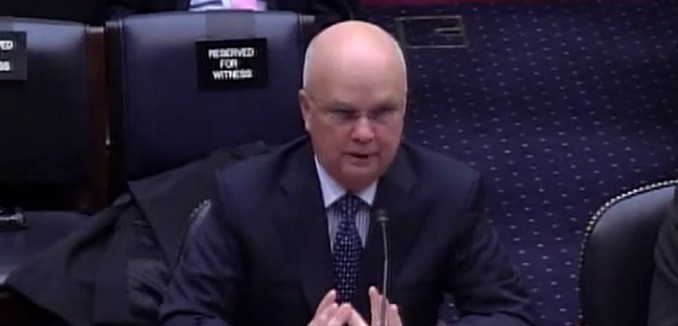In a House subcommittee hearing yesterday, former Director of National Intelligence Gen. Michael Hayden said that Iran and its possible acquisition of nuclear weapons was one of the things that “keep me awake at night”.
In his prepared remarks (.pdf) Hayden made four observations about Iran and its nuclear program, including that “Iran is a difficult intelligence target” because its decision-making process is “opaque.” His second observation noted that “our knowledge of the Iranian nuclear program is incomplete,” and he decried Iran’s stonewalling of the International Atomic Energy Agency (IAEA) from possible nuclear weapons sites. He also observed that “at a minimum Iran is working very hard to keep its nuclear weapons option available,” given its “investment in time, energy, commerce and national prestige that Iran has been willing to make.”
Hayden’s final observation was that “Iran is already too close to a nuclear weapon,” and that therefore the goal of the P5+1 “must be to roll back the Iranian program, not freeze it in place.”
Other witnesses at the hearing were Mark Dubowitz (.pdf), the executive director of the Foundation for Defense of Democracies and Karim Sadjadpour (.pdf) of the Carnegie Endowment for International Peace.
In a video of the complete hearing (embedded below) Hayden, in response to a question from Rep. Ted Deutch (D-Fla.), explained why Iran’s lack of forthrightness was an obstacle to preventing Iran from developing nuclear weapons. Hayden’s answer begins at 1:11:04 in the video.
The real concern is that we don’t know the point of which they are now part … we’re really talking about the weaponization program. We’re really talking about the hardening, about the miniaturization sciences involved in creating the nuclear detonation. That’s not the long pole in the tent. The long pole in the tent is the fissile material. And if you recall even in 2007 when we said good evidence they’ve stopped weaponization, they kept working on the long pole which was the fissile material. …
There isn’t a neutron or an electron in Natanz that’s every going to show up in a nuclear weapon. What they’re building in Natanz is confidence. What they’re building in Natanz is technology, the ability to do this. They’re going to build the fissile material for a weapon, the HEU (Highly Enriched Uranium) at a site about which we have no knowledge. …
Our lack of knowledge, our lack of an ability to go to locations where they may be doing these things gives me very little confidence that we know how … as I said … We’re not going to get an agreement that absolutely prevents, we’re going to get an agreement that creates enough space for us to do something between the decision to go and the decision to have.
A former Obama administration official told The New York Times last year, “there has never been a time in the past 15 years or so when Iran didn’t have a hidden facility in construction.”




